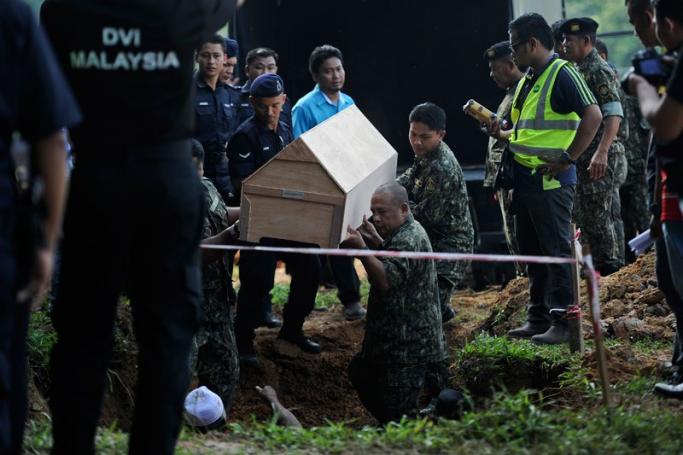The remains of many of the 106 people found at an abandoned human trafficking camp near the Thai-Malaysian border have been identified, with 21 of them given a proper burial on Monday, said Malaysia’s Home Affairs Minister Zahid Hamidi Channel News Asia reported on 22 June.
The dead migrants, who were found in a forested area in Wang Kelian, Perlis, were from Myanmar and Bangladesh, Mr Zahid said, adding that a “large number” of them have been identified thus far.
“This reburial can now happen because the forensic team is satisfied with the post-mortem findings so far,” he told media outside Malaysia's parliament.
“The first body we found were skeletal remains in an enclosure which had been left in there until dry. That was one form of cruelty they were subject to.”
Investigators identified the causes of death as disease, starvation, torture or murder.
The abandoned sites in Malaysian territory were discovered late last month after the massive scale of human smuggling was exposed by a Thai crackdown on trafficking networks, which has left thousands of desperate people stranded at sea on rickety boats.
The dense forests of southern Thailand and northern Malaysia have been a major staging post for smugglers bringing people to Southeast Asia by boat from Myanmar, most of them Rohingya Muslims who say they are fleeing persecution, and Bangladesh.
Malaysia is working closely with those nations as well as neighbouring Thailand to bring those responsible to justice. Several arrests have already been made.
“We are grateful to the Thai authorities especially the police and border officials for giving their full cooperation,” Mr Zahid said.
The camps on Malaysia's side of the border, which could have been capable of housing hundreds of people, drew allegations that authorities and residents had turned a blind eye to the lucrative business.
Malaysian Deputy Home Minister Wan Junaidi Tuanku Jaafar said at the time that investigations showed the bodies were wrapped in shrouds and their resting places marked with wooden sticks.
He said Malaysian security forces had not been patrolling the area because it was thought to be inaccessible but began surveying it after the discovery of graves in Thailand.
You are viewing the old site.
Please update your bookmark to https://eng.mizzima.com.
Mizzima Weekly Magazine Issue...
14 December 2023
Spring Revolution Daily News f...
13 December 2023
New UK Burma sanctions welcome...
13 December 2023
Spring Revolution Daily News f...
12 December 2023
Spring Revolution Daily News f...
11 December 2023
Spring Revolution Daily News f...
08 December 2023
Spring Revolution Daily News f...
07 December 2023
Diaspora journalists increasin...
07 December 2023












